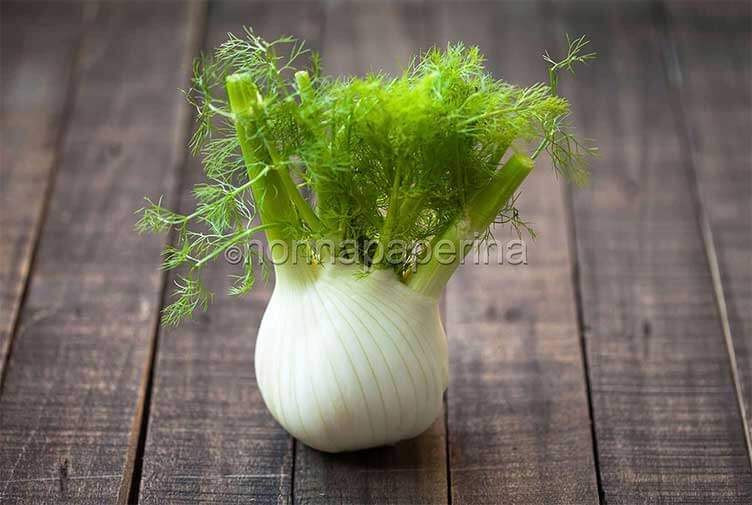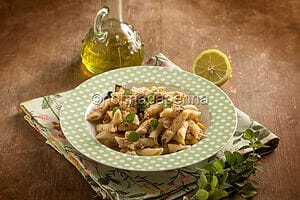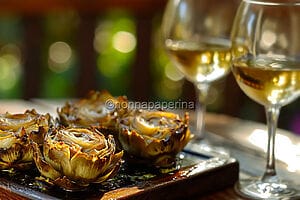Grandma Ducky » Seasonal ingredients » Fennel
Fennel

The high nutritional value of fennel
The term “fennel” primarily refers to the plants bearing the same name. It grows naturally, of course, but it can also be farmed. On the other hand, the fennel bud—the cluster of white leaves around the plant—and seeds are used in cooking. The first is used to prepare wonderful herbal teas, especially scented ones. Rather, the second is thought to be the only component that is actually edible. The grumolo, as previously said, is essentially a dense, extremely fleshy pair of leaf gloves stacked on top of one another. In this article, we will talk exclusively about the fennel bud.
It is characterised not only by a delicious and distinctly aromatic flavour but also by its high nutritional value. The reference is to vitamins and mineral salts. Fennel contains a lot of potassium, a lot of vitamin E and vitamin C, as well as some vitamins in group B. There is also a fair amount of flavonoids and antioxidants that are good for the body.
In addition, fennel has an extremely low calorie content—9 kcal per 100 grammes—which is nearly unheard of in the vegetable world. Although the fennel plant grows year-round, the bud is harvested approximately three months after sowing.
The characteristics of the different varieties of fennel
The varieties of fennel are not that numerous and are mainly distinguished by the ripening period, the shape, and only partially by the flavour. Here are the most popular ones:
- Summer Rondo: The lumps have an almost ethereal white colour and a highly spherical form. It has a medium-sweet flavour.
- Winter servant: The bud is very large and slightly ovoid in shape. The flavour is both sweet and aromatic.
- Autumnal carmo: It is characterised by its accentuated dimensions and a very large and heavy lump. Although it retains a certain sweetness, it is still one of the most aromatic varieties.
How is it cooked?
Fennel is generally eaten in salads seasoned with a little oil and vinegar rather than as a dip. This does not mean, however, that it cannot be used for slightly more complex preparations. There are a few intriguing ones in this section. I’m talking about a kind of bright, fragrant soup. The salad is relatively simple to prepare, but it’s also interesting from an organoleptic perspective.
It can also be a risotto ingredient. The same is true of some well-known cuisine adaptations for vegetarians. I’m referring to vegetarian carbonara, which uses this vegetable to replace bacon.
Here are some delicious recipes:
In the kitchen, fennel is a valuable ally, even for those who enjoy trying new things. Presenting some delectable foods that can wow diners is therefore worthwhile.
Creamy fennel and prawn soup: It is a soft first course with an aromatic and delicate flavour. This recipe features audacious yet effective pairings, like the one including shrimp and fennel. The fennel is first boiled and then pan-fried with the other ingredients. Everything is then blended to create a splendid, velvety soup.
Ravioli with salmon and fennel: It is an apparently simple first course, but it offers complex aromas. The delicate aroma of the vegetable enhances the savoury and “fatty” flavour of the salmon.
Red aubergine carpaccio and fennel: It is a unique side dish, as it is based on the concept of marinating supported by red aubergines, which are among the few varieties that can be consumed raw. In addition, the marinating process gives the fennel a softer consistency and a more aromatic flavour.
Fennel and coconut pie: Among the recipes with fennel, this is one of the most intriguing of all. The filling is the result of the union with coconut and marks one of the most daring combinations imaginable.
Fennel stuffed with ricotta and speck: Here, the fennel is prepared similarly to a tomato or bell pepper; it is packed with a delicious concoction of ricotta and speck.
Sautéed fennel with tempeh and olives: It is a special side dish that combines typically Mediterranean ingredients, such as fennel, with tempeh, a preparation of oriental origin made with fermented soybeans.
What are the benefits of fennel?
As we have seen, fennel boasts a good nutritional profile, so we can openly talk about its benefits for the body. Here are the most obvious ones:
- It helps prevent cancer: The presence of antioxidants, which maximise cellular turnover and intervene when DNA damage occurs, is responsible for this function.
- It helps you lose weight: The issue does not only concern calorie intake, which is basically very low, but also “perceptions.” The consumption of fennel produces a sense of satiety capable of limiting hunger and discouraging snacking.
- It helps with digestion: Like many other vegetables, fennel also stimulates digestive function by virtue of its marked abundance of fibre.
- Promotes the production of breast milk: This is a very unique and useful function that is seen in very few other foods of plant origin.
- Helps purify the body: Fennel is good for the liver and kidneys. The abundance of water then helps to counteract water retention and stimulate diuresis.
At this point, it is legitimate to ask: Does fennel have any contraindications? Basically, it is a safe veggie; however, excessive consumption can lead to “intestinal” consequences. The abundance of fibres sometimes turns into a double-edged sword that can have a mildly laxative effect.
Some curiosities about this excellent vegetable
How do you clean fennel?
It is very easy to clean fennel in order to prepare it for cooking or eating fresh. They need to be cleaned with running water and scraped with a small knife to remove any remaining dirt. Then the external leaves are cut and used.
Does fennel make you lose weight?
Il finocchio in sé non fa dimagrire, ossia non contiene sostanze che possano stimolare il metabolismo in modo sostanziale. Tuttavia torna utile a chi vuole perdere peso in quanto produce un senso di sazietà, che rende più facile la dieta.
Is eating too much fennel bad for you?
Fennel lacks compounds that can significantly increase metabolism; hence, by itself, it cannot aid in weight loss. Still, it is helpful for weight loss since it increases feelings of fullness, which facilitates dieting.
Never self-diagnose!
There is a lot of talk about food intolerances and food allergies. The problem is that it is often talked about badly, the waters are muddied and ineffective advice is given.
For example, there is a common idea that intolerance and allergy are the same thing. It’s not like that. Of course, from time to time the symptoms overlap, and a substance can simultaneously cause intolerance and allergy, but these are two different disorders.
Intolerance is the negative reaction to taking a certain substance. Allergy, on the other hand, is the negative reaction to contact with a certain substance. This contact can be the result of actual intake, but it is not exclusive, i.e. it can also only occur at a skin level.
Intolerance rarely involves the immune system, while it more frequently involves the organs of the digestive system. In the vast majority of cases an individual is intolerant because his body does not contain the enzymes necessary for the metabolism of a substance. This is the case of the lactase enzyme for lactose intolerants. On the other hand, allergies always involvethe immune system. For often genetic reasons, the organism identifies an “enemy” in that specific substance, a foreign and dangerous body, and therefore reacts in a “disorderly” manner.
Differences are also noted regarding the incidence. The percentages change from population to population, given and considering the strong genetic component of these disorders. However, according to recent estimates, up to 4% of the population suffers from some form of food allergy. However, the percentages regarding food intolerances are even higher. There is also talk of 20-30%. The data is “dirtied” by the incidence of lactose intolerance, which is incredibly widespread. Allergies tend to begin in the first years of life, and in some cases disappear by adulthood. Intolerances, however, appear more frequently after adolescence.
Symptoms and triggers
The heterogeneity of symptoms that allergies and intolerances cause also derives from what has just been said. Allergy symptoms are often systemic and violent, and can include severe malaise, rush and respiratory problems. If the interaction with the substance occurs on the skin, eczema may be noted in the contact area. This is the case of nickel allergy. There is no shortage, especially when taken, of gastrointestinal problems, such as pain, cramps, diarrhea and nausea.
The symptoms of intolerances are more limited and are mainly gastrointestinal. This occurs – in most cases – because the body is unable to assimilate the substance, therefore it produces gas in an attempt to do so. This abnormal quantity of gas causes the symptoms we have just described. This is precisely the case with lactose intolerance, in fact lactose remains mostly intact, rather than breaking down into glucose and galactose, stimulating an accumulation of gas.
A difference between allergies and intolerances, which is often mistaken for a common point, is the class of substances that trigger one or the other. In the case of allergies, the offending substance is a food as a whole. In the case of intolerances, it is often a molecule, a sugar or a protein. The most common food allergies involve milk, millet, wheat, eggs and shellfish. The most common food intolerances, however, concern lactose, gluten and so on.
This has varied consequences on living standards. In essence, those with allergies are much more compromised. Having to avoid a substance is one thing, having to avoid a food is another matter entirely. Just to give an example, those who are lactose intolerant can still drink milk and consume dairy products, as long as they are lactose-free. Those who are allergic to milk do not have this option.
How to diagnose allergies and intolerances?
The diagnosis of food allergies is essentially clinical, therefore it is the result of the observation of visible and empirically measurable reactions. This has led to the belief that even a single individual can reach a diagnosis without the help of an expert.In reality, it is a huge mistake. Self-diagnosis is fallacious because to correctly identify the disease, a wealth of knowledge is needed which is useful for the interpretation of the phenomena. Furthermore, it is also dangerous as it risks triggering the symptoms of the disease.
It is true that the diagnosis passes through trials and errors, but these must follow one another from a risk reduction perspective typical of the medical profession. Therefore, yes to eliminating this or that element from the diet, to understand if it is precisely this that triggers the allergic symptoms. Yes also to adding further doses of the suspected allergen to check the body’s reaction, but according to very precise stages and indications, provided by the specialist. Intolerance is also diagnosed or more frequently “discovered” with the addition or subtraction of specific elements from the diet. However, the first aim is to exclude allergy, which is quite simple given the diversity of symptoms.
In some cases, some tests are available that guarantee a diagnosis. This is the case of the breath test for lactose intolerance. The patient is invited to consume milk, progressively. Subsequently, he blows into a machine that analyzes the composition of the air introduced. If there is an excessive quantity of carbon dioxide, then there is an intolerance, in fact the abundance of CO2 is caused precisely by poor digestion and malabsorption. If there is a suspected case of celiac disease, however, blood tests can be carried out to trace specific antibodies, as this pathology still “stimulates” the immune system.
Cook with seasonal ingredients
Don’t worry be happy
Cosa può fare per voi Nonnapaperina.it
Ho già introdotto il motivo per cui ho intrapreso il progetto di Nonnapaperina.it, ossia condivisione della mia esperienza e la possibilità, per tutti, di fruire di soluzioni a portata di mano per un’alimentazione a prova di intolleranze alimentari. Tanto vale, quindi, parlare un po’ del sito e dare qualche consiglio per “viverlo” al meglio. Ad esempio, per la vita di tutti i giorni, fate riferimento alla sezione “ricette per intolleranti”. Ne trovate a bizzeffe, tutte categorizzate per portata (primi, secondi etc.), momento della giornata (colazione, pranzo, cena), funzione (basi, impasti, creme, salse) e molto altro ancora. Non trascurate, però, anche la sezione sulle festività. Se il principio cardine del progetto è la condivisione, allora la palla passa presto a voi, quindi condividete liberamente le ricette con i vostri cari e con i vostri amici. E quale migliore occasione di una festività, sia essa il Natale, la Pasqua o la Festa della Mamma? Non di rado le ricette hanno un ché di artistico. I piatti porgono il fianco a un concetto “elevato” di cucina, che coinvolge non solo il senso del gusto, ma pone le basi per un'esperienza a tutto tondo. Il tutto a uso e consumo degli intolleranti alimentari, o degli amanti del buon cibo in generale. Il consiglio, comunque, è quello di spaziare. Il sito è basato sul principio dell’ipertesto, ossia ciascuna ricetta ne richiama altre, e molte altre ancora. Lasciatevi trasportare e vi sembrerà realmente di intraprendere un viaggio nella cucina anti-intolleranze alimentari, nella sua versione più “friendly” e divertente! Buona degustazione a tutti! Intolleranze alimentari e allergie si sconfiggono a tavola Quello delle intolleranze alimentari e delle allergie rischia di diventare un problema di ordine sociale se non viene gestito con attenzione. In primis per le dimensioni del fenomeno. Si stima, infatti, che circa il 10% della popolazione soffra di un qualche disturbo legato all’assorbimento di sostanze alimentari e, allo stesso tempo, in grado di generare sintomi più o meno importanti. Sul banco degli imputati vi sono l’intolleranza al lattosio e la celiachia, che sono le patologie in assoluto più diffuse, ma vanno prese in considerazione anche l’allergia e la sensibilità al nichel. Per inciso, la distinzione tra intolleranza e allergia è fondamentale ai fini medici. I sintomi sono infatti diversi per tipologia o per intensità (o per entrambi). A fare il bello è il cattivo tempo è in particolar modo l’allergia, che coinvolge il sistema immunitario e quindi determina una sintomatologia spesso e volentieri sistemica. Le intolleranze alimentari, invece, producono prevalentemente sintomi gastrointestinali. Discorso a parte per la celiachia, che tecnicamente non è un’allergia, ma coinvolge ugualmente il sistema immunitario. La distinzione tra intolleranza e allergia, tuttavia, assume una posizione di secondo piano per quanto concerne gli approcci terapici, o per meglio dire “di gestione”. Al netto di alcune eccezioni, che riguardano i casi di “scarsa tollerabilità”, intolleranze e allergie vanno trattate allo stesso modo, ovvero evitando le sostanze che creano i disturbi. Nella quasi totalità dei casi, infatti, non esiste una terapia risolutiva e quindi la guarigione è un'ipotesi da escludere. Ne è consapevole chi viene raggiunto da una diagnosi di intolleranza o allergia. L’impatto emotivo della diagnosi è molto forte proprio per l’impossibilità di raggiungere una guarigione completa. Sia chiaro, il disorientamento iniziale è fisiologico e giustificato. Tuttavia, deve essere destinato a durare poco, ovvero il tempo necessario a prendere atto della buona notizia riguardante intolleranti e allergici: convivere con questi disturbi si può! E’ possibile quindi convivere con i disturbi alimentari senza rinunciare ai propri piatti preferiti e senza dire addio al proprio stile alimentare.Non surrogati ma scelte alimentari consapevoli
Le intolleranze alimentari e le allergie si combattono non solo con le armi della medicina, ma anche attraverso un cambio di mentalità, che a sua volta coinvolge il modo di intendere la cucina. Il trucco è semplice, basta non guardare agli alimenti anallergici e anti-intolleranze come a dei surrogati degli “alimenti normali”. Gli alimenti per intolleranti sono infatti alimenti dotati di una propria specificità e in grado di offrire molto sul piano organolettico e visivo. Chi soffre di intolleranze alimentari e di allergia non dovrebbe replicare il consumo di latte, pane o altri alimenti, ma dovrebbe valorizzare gli alimenti a cui può attingere in tutta sicurezza. Adottare questo approccio significa innanzitutto svincolarsi dal ruolo del “malato”, focalizzandosi in realtà su altri alimenti. Ad aiutarci in questo senso c’è la natura con le sue molteplici varietà. Gli alimenti che fanno al caso del celiaco, o all’intollerante al lattosio, sono numerosi e spesso buoni e belli da vedere; inoltre sono molto versatili in quanto possono dare inizio a molte ricette davvero sfiziose. Non lo sono solo per chi soffre di queste patologie, ma anche per tutti gli altri. Le implicazioni dal punto di vista sociale sono evidenti. Col mio sito di cucina porto avanti esattamente questa filosofia. Non è solo uno spazio per conoscere ricette, ma anche un vero e proprio manifesto per chi vuole affrontare le intolleranze alimentari con armi meno tediose di quelle esclusivamente sanitarie. In quest’ottica la farina di riso non è un surrogato della farina tradizionale, ma un elemento a parte con cui realizzare ricette deliziose, che si abbinano con una grande varietà di ingredienti. E lo stesso, ovviamente, si può dire delle farine di amaranto, di fonio, di quinoa etc. Un discorso simile può essere fatto anche per l’intolleranza al lattosio. Al netto della possibilità di delattosare il latte, le varianti vegetali godono di una propria dignità gastronomica e porgono il fianco a un interessante approccio creativo in cucina. Tra l’altro, questo cambiamento forzato pone le condizioni per un viaggio attraverso le cucine alternative e gli alimenti più esotici. Ecco che si capovolge la prospettiva: intolleranze e allergia non sono solo una condizione gestibile, ma anche un’occasione di arricchimento.Intolleranze alimentari e socialità, un falso problema
Un altro dei motivi per cui la diagnosi di intolleranza o allergia fa molta paura, gettando nello sconforto chi ne soffre, riguarda le implicazioni per la vita sociale. Chi ha ricevuto una diagnosi da poco è convinto nella maggior parte dei casi che la sua patologia inciderà negativamente sulle occasioni di socialità, sia dal punto di vista psicologico - emotivo che dal punto di vista pratico. Il timore è quello di sentirsi diversi e in qualche modo lontani dai canoni della normalità, questo può portare a disagi anche tra parenti e amici. In realtà sono paure infondate. In primo luogo una condizione patologica non corrisponde a una condizione di “anormalità” (al netto dell’inconsistenza semantica del termine). Secondariamente basta un minimo di organizzazione e di consapevolezza per gestire anche le occasioni di socialità. Anzi, quando queste si svolgono fuori di casa, ossia nei locali adibiti alla ristorazione, la questione è addirittura più semplice. I gestori infatti sono nella maggior parte dei casi preparati ad accogliere clienti con intolleranze e allergie. In ogni caso basta informarsi prima e scegliere di conseguenza. Ma il problema non si pone nemmeno se si mangia a casa di altri, o se si invitano a casa propria delle persone. In primo luogo perché le diagnosi di questo tipo non fanno scalpore in quanto sono ormai molto diffuse. In secondo luogo perché i piatti per chi soffre di intolleranze alimentari sono in realtà buoni per tutti, anche per chi non soffre di alcun disturbo. Al netto di tutto ciò, se si pone attenzione al tema della contaminazione alimentare, cucinare per intolleranti alimentari (o per allergici) è più semplice di quanto si possa immaginare.Did you know that

Sustainable Christmas lunch: ideas for an eco-friendly menu
Sustainable Christmas lunch ideas and delectable meals that seamlessly blend work and play With Christmas quickly approaching, now is the perfect time to consider the menu and organise an inclusive and sustainable Christmas lunch. When discussing a Christmas lunch, without betraying the expectations of those who want to eat a lot, I have to take into consideration environmental issues. In short, a genuine Christmas lunch with high value is not only gourment but also ethical. None of this implies putting a negative spin on Christmas or even being choosy. Sustainable practices are...
Most read articles and recipes

Breakfast for students, some nutritious ideas
Classic ideas for the perfect breakfast How to have breakfast correctly? What is the perfect...
Lampredotto sandwich, a snack of yesteryear
The Tuscan sandwich, a popular fast-food The spannocchia...
Fiorentina steak: the secrets to cooking it properly
Fiorentina steak, a delectable second course A rare steak...
Wagyu tartare, ginger oil, and oyster sauce
Seeing is believing; this Wagyu tartare is truly...
Jerusalem artichoke syrup, a versatile dish
An ideal syrup for a variety of sweets Jerusalem artichoke...
Latest recipes, pills and advice

Cold summer pasta, a light but flavour-rich version
A recipe to fill you up and keep you light Among the...

Raspberry puff pastry heart, a Valentine’s Day delight
A simple filling that gives out a lot Since the filling...

Roman-Jewish fried artichokes, a traditional Roman dish
Origins and curiosities of Roman-Jewish fried...

Vanillekipferl, traditional German tea biscuits
How did vanillekipferl biscuits come to be? Part of the...

Cocoa crumble with fresh fruit, a delicious dessert
Which fruit is best for a cocoa crumble? Cocoa crumble...
Never self-diagnose
Symptoms and triggers
What was previously discussed also explains the variety of symptoms that allergies and intolerances create. Allergic symptoms are often systemic and violent and can include severe malaise, rashes, and respiratory problems. If the interaction with the substance occurs on the skin, eczema may be noted in the contact area. This is the case with the nickel allergy. There is no shortage, especially when taken, of gastrointestinal problems, such as pain, cramps, diarrhoea, and nausea. More specific and primarily gastrointestinal symptoms are associated with intolerances. This usually happens as a result of the body trying to digest the material but failing, which causes it to create gas. The symptoms we have discussed are brought on by this abnormally high gas content. This is exactly the case with lactose intolerance; in reality, lactose typically stays intact instead of converting to glucose and galactose, which would otherwise cause gas to build up. A difference between allergies and intolerances, which is often mistaken for a common point, is the class of substances that trigger one or the other. In the case of allergies, the offending substance is a food as a whole. In the case of intolerances, it is often a molecule, a sugar, or a protein. The most common food allergies involve milk, millet, wheat, eggs, and shellfish. The most common food intolerances, however, concern lactose, gluten, and so on. This has varied consequences for living standards. In essence, those with allergies are much more compromised. Having to avoid a substance is one thing; having to avoid a food is another matter entirely. Just to give an example, those who are lactose intolerant can still drink milk and consume dairy products, as long as they are lactose-free. Those who are allergic to milk do not have this option.How to diagnose allergies and intolerances?
Food allergies are mostly diagnosed clinically, which means that they come from the observation of discernible and experimentally quantifiable reactions. This has given rise to the myth that even one person can diagnose himself without the assistance of a specialist.In reality, it is a huge mistake. Self-diagnosis is fallacious because, to correctly identify the disease, a wealth of knowledge is needed, which is useful for the interpretation of the phenomenon. Furthermore, it is also dangerous, as it risks triggering the symptoms of the disease. It is true that the diagnosis passes through trials and errors, but these must follow one another from a risk reduction perspective typical of the medical profession. Therefore, yes to eliminating this or that element from the diet to understand if it is precisely this that triggers the allergic symptoms. Yes, as well as adding further doses of the suspected allergen to check the body's reaction, but according to very precise stages and indications provided by the specialist. Intolerance is also diagnosed or more frequently "discovered" with the addition or subtraction of specific elements from the diet. However, the first aim is to exclude allergy, which is quite simple given the diversity of symptoms. In some cases, there are available tests that guarantee diagnosis. This is the case of the breath test for lactose intolerance, in which the patient is invited to consume milk gradually. Subsequently, they blow into a machine that analyses the composition of the air introduced. If there is an excessive quantity of carbon dioxide, then there is an intolerance; in fact, the abundance of CO2 is caused precisely by poor digestion and malabsorption. If there is a suspected case of celiac disease, however, blood tests can be carried out to trace specific antibodies, as this pathology still "stimulates" the immune system.Specific Instrumental exams
It is worthwhile investigating instrumental exams in more detail. Many people actually get a sense of awe when they consider the diagnostic process, imagining the intricate or agonising procedure. All in all, it's really easy and not too complicated. This is particularly true for the breathalyser test. As I have previously said, there is still work to be done on the "preparation" issue, which is one that merits special attention. In truth, there are strict guidelines that must be followed; you cannot simply turn up for the breathalyser test as if nothing had happened. The most crucial one relates to fasting, which must continue for the eight hours before the exam. Arriving with an "empty" stomach and intestines will allow for an unbiased analysis of the effects of lactose on the digestive system, similarly with smoking. In actuality, smoking can progressively change respiratory function, which could cause mistakes by the tester. Eating light during the final supper (at least eight hours prior to the exam) is also a smart option. In this sense, we advise consuming foods that cause less intestinal gas, such as rice, meat, or fish. From a medical perspective, the tests used to diagnose celiac disease are more complicated. For the patient, they are a "piece of cake," since they only require a basic blood test. Next, an analysis is conducted to confirm if certain antibodies against gluten are present. Antibodies can be identified as anti-gliadin (AGA), anti-endomysium, or anti-transglutaminase (tTG). Although it is evident that the results are tough to read, professionals and specialists are available to help. It is feasible to do some genetic testing if the results are unclear or if celiac disease is detected at an early stage. These are meant to confirm whether genetic components linked to celiac disease are present. Genetic tests are somewhat uncommon, partly due to their high cost.Behaviours and therapies
The only genuine treatment for a food allergy is removing the food entirely from your diet. This isn't always feasible, though, as it can seriously lower the quality of life in certain situations. An unusual event that only applies to circumstances where multiple allergens are present at once. In these cases, we proceed with immunotherapies, which involve the gradual and increasing exposure to the allergen in an attempt to restore a correct immune response. In the worst-case scenario, i.e., when the sensitivity is extreme, chelating drugs can be taken, which effectively detoxify the body from the offending substance. The same goes for celiac disease, except that in this case we stop at eliminating gluten. It is in fact a less burdensome effort than you might think, since there are many foods that can best replace full-gluten foods. It is a different story, however, for lactose intolerance. In this case, it is possible to avoid milk, dairy products, and fresh cheeses or focus on lactose-free variants. Removing lactose is a trivial operation that only alters the taste a little. The process consists of introducing the lactase enzyme into the milk. This enzyme, which is missing in intolerant people, actually "breaks down" lactose, which then transforms into glucose and galactose, substances that are digestible by all.The lifestyle of those suffering from food intolerances
Does the quality of life significantly decline for people with food allergies or intolerances? Yes, as common sense would have it. If giving up the foods causing the symptoms is the sole treatment option, with the exception of specific circumstances (such as immunotherapy), it may be easily concluded that these conditions rob people of one of life's greatest pleasures: eating anything they want. It is logical, but it only holds true if those who have been diagnosed "let themselves go" and do not behave shrewdly when confronted with a real situation. The truth is simple: you can live with intolerances and allergies without compromising your relationship with food. In short, we can avoid exchanging physical suffering (symptoms of intolerances and allergies) with psychological suffering. The secret lies in changing your approach to nutrition and undertaking a journey of knowledge about foods. There are many meals found in nature that can take the place of ones that are off-limits because of an allergy or intolerance. In the vast majority of cases, they are good, nutritious, and lead to good cuisine. There are certain "ingredients" required in order to start and finish this voyage. Prior to anything else, the diagnosis must be psychologically processed. Everyone eventually comes to terms with it, although it's not an instant process. Secondly, a shift in mindset that goes beyond the "classic Mediterranean" perspective and is more receptive to novel flavours is required. Coincidentally, a large portion of the "usable" items and the recipes that call for them originate from other sources. Finally, cultivating a genuine culture of sharing is beneficial. Engaging others in one's personal development, or even just sharing "anti-intolerance" meals, helps to reestablish a sense of normalcy and modifies the way that "healthy" individuals view allergies and intolerant people.Some details on lactose intolerance and celiac disease
What does it mean, precisely, to have one of these disorders? In response, I narrowed the focus of the inquiry to the two most common: celiac disease and lactose intolerance. However, I have personal experience with it as I deal with both. I can now claim that, having gone on a voyage of evolution and understanding regarding my relationship with food, I am satisfied. I don't see these disorders as a problem since I carefully consider the compromises I must make in order to live with them, both psychologically and as a lifestyle. To address lactose sensitivity, for instance, I use plant-based milk substitutes like soy, almond, and coconut milk in place of milk and its derivatives. I can safely consume lactose-free items as they are just as wonderful as "normal" ones, but they are a little more expensive. I have always loved experimenting, but having celiac disease caused a drastic shift in my cooking style, resulting in the discovery of many new foods and a newfound level of creativity. Like everyone else, they substitute rice and corn flour for wheat flour, but I also use and create delectable recipes using a variety of unusual flours. Any examples? flour made from amaranth, quinoa, fonio, etc. It is a pleasure rather than an effort. They also, for the most part, give the food a fantastical touch without taking into account their nutritional qualities, which are frequently more prominent than those of regular flours. They are also frequently high in vitamins, mineral salts, and a lot of proteins. There aren't many variations in terms of calorie consumption because, well, flour is flour!
Explore the Versatility of Cucinarea: Your Culinary Stage
Cucinarea is much more than just a space. It is a unique environment where passion for food and design come together, creating a unique atmosphere for every type of event. With elegant spaces and state-of-the-art equipment, Cucinarea is the ideal place to make every occasion memorable. Whether it's cooking classes, business meetings, or large-scale events, discover how we can enhance every initiative you have.
Cooking Classes: Learn from the Best
At Cucinarea, we host cooking classes each month that focus on elegant and sophisticated menus. You will have the opportunity to learn directly from renowned and specialized chefs, who will guide you in preparing dishes that will amaze your guests. Our courses strike a perfect balance between entertainment and learning, taking place in a welcoming and refined environment, ideal for anyone looking to improve their culinary skills. The courses are divided into two phases: a practical demonstration by the chef and a tasting phase, where you can taste and share the freshly prepared dishes, turning learning into a real pleasure.
Meeting and Conference Room: Combining Elegance and Functionality
Our meeting room is designed to host a wide range of corporate events and conferences. Spacious and well-furnished, this room provides an ideal environment for business meetings, presentations, and special initiatives. It is the perfect setting to promote networking, professional updates, and team spirit strengthening. Our rooms can be configured for executive meetings, business negotiations, or both formal and informal events. With high-level culinary offerings, every meeting becomes a memorable occasion.
Home Chef Service: Transform Your Home into a High-Class Restaurant
Our home chef service brings high-quality cuisine from the best restaurants directly to your home. This service mode is gaining popularity, allowing you to enjoy the thrill of having a personal chef without leaving the comfort of your home. Home chefs are expert professionals who adapt their menus to create memorable events, whether they are formal dinners or more casual gatherings. The preparation of the dishes takes place right before your eyes, making every occasion a special and personalized moment. Each event managed by our chef becomes a unique occasion, carefully designed to meet the specific needs of each client.
Team Building: Growth and Fun
Team building is a series of activities designed to strengthen team spirit and improve cohesion among team members. Through cooperative and fun challenges, participants work together to achieve common goals, improving communication and interaction. Our team building activities are designed to be not only effective but also engaging, creating a positive and stimulating environment. These experiences are crucial for forming cohesive and motivated teams, which translate into better performance at work.
Event Rooms: Perfect Locations for Unforgettable Moments
Our event rooms offer the ideal space for any type of party or celebration. Every detail is designed to create an environment that is not just a place, but a starting point for building precious memories. Whether it's an intimate gathering or a large celebration, our rooms are adaptable to realize the event our clients have always dreamed of. From the arrangement of spaces to lighting, every element is adjustable to meet the most specific needs.
Locations for Photo Shoots
Cucinarea also offers ideal spaces for photo shoots and video productions. Our spaces are designed with great attention to style and decor, creating unique settings that enrich every type of photographic service or video production. From the sober and elegant style of the conference room, ideal for institutional videos, to the lively environment of the kitchen, perfect for culinary videos, every corner of Cucinarea is designed to be photogenic and functional.











